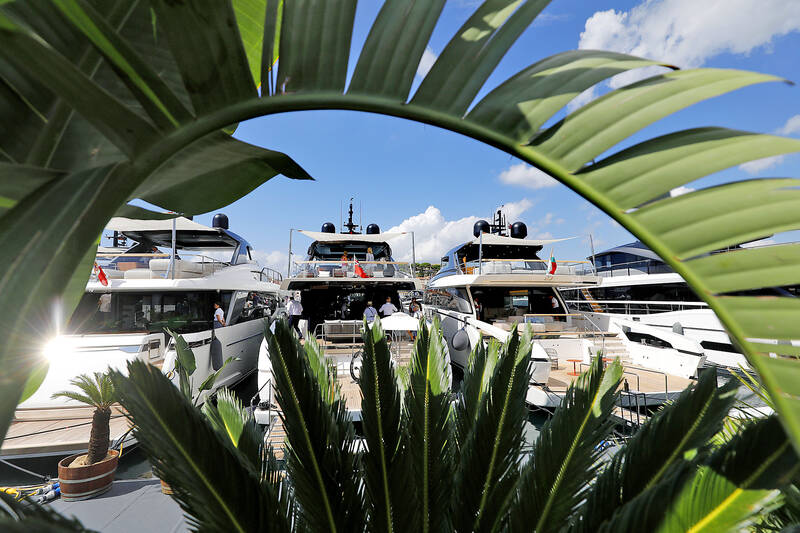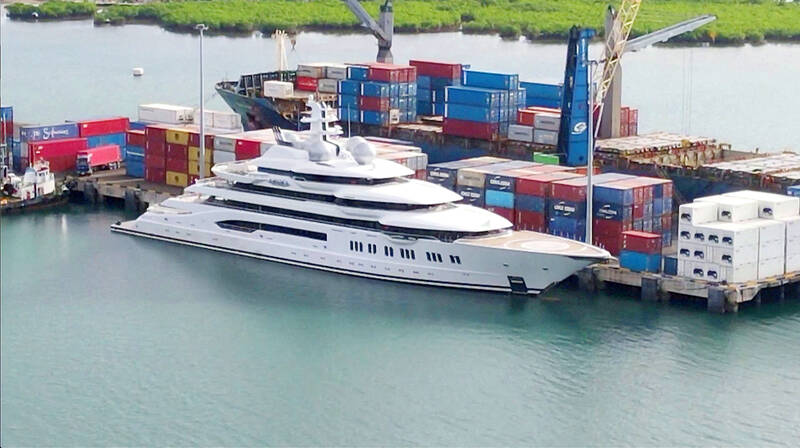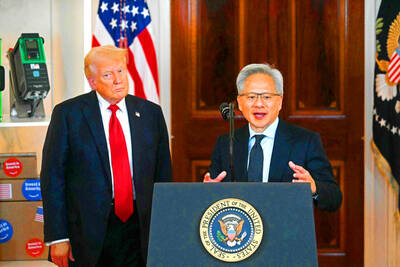Stacy Fischer-Rosenthal and her 30-strong team have had a busy summer booking private yachts for bankers, CEOs and other high flyers now liberated from the shackles of the COVID-19 pandemic and willing to pay millions of dollars for week-long luxury cruises.
Bookings for superyachts through Fischer Travel Enterprises, where Fischer-Rosenthal is president, have spiked 20 percent this year from already high levels last year, a trend also seen by other companies chartering out luxury vessels that can come with all the frills from Michelin-starred cuisine to cinemas and submarines.
“Yacht charters are very popular because our clients want the privacy, security and flexibility that it gives them,” Fischer-Rosenthal said.

Photo: EPA-EFE
Her company charges US$150,000 just to join its members-only service, through which superyachts can be chartered anywhere around the world.
“They want to have a luxurious experience,” she said about her customers.
Americans are a growing client base, helping to fill gaps left by wealthy Russians who are not traveling as much due to restrictions following their country’s invasion of Ukraine.

Photo: Reuters
And it is not just the likes of Elon Musk or Beyonce and Jay-Z hiring out these glitzy floating palaces.
Fischer-Rosenthal said a couple from the US enjoyed their cruise in Greece and Turkey in July so much they booked another in Italy shortly after and invited friends along.
Fraser Yachts, which sells and manages superyachts, and arranges charters, booked nearly 500 private trips in the first half of this year, company director of marketing and business development Mark Duncan said.
Bookings are up 32 percent from last year, and again most of the growth is being driven by Americans, many of whom are renting for the first time, said Duncan, who is based in Monaco.
Among the megayachts the firm hires out is Wheels, a 75m vessel with a gym and nightclub.
The number of Americans with a net worth of US$1 million to US$5 million last year grew 8 percent to more than 12 million, while those worth US$25 million or more climbed 18 percent, according to research company Spectrem Group.
“Our clients are high-net worth individuals, running banks and hedge funds,” Fischer-Rosenthal said. “They’ve made a lot of money in the last few years. Now they want to travel again and they want the best.”
Customers are also getting younger, now averaging in their 50s rather than the 60-to-65 age bracket in the past two decades, Duncan said.
This year, about 35 percent of Fraser’s clients are new to yachting, compared with up to 15 percent previously, he said.
Cruises involving several generations from the same family are also more popular.
“During the pandemic, people couldn’t be with their families,” Duncan said. “Yachts can be big enough for all to be together. Unlike a home, you’re not stuck in one place. And you can control the environment and test everyone for COVID if that’s a concern.”
The trend of families and friends traveling together is spurring demand for bigger superyachts.
Monaco-based Camper & Nicholsons International Ltd is seeing highest demand in the 50m to 60m range, said Jacqui Lockhart, the firm’s Europe head of charter management.
“They often know exactly what they want — a big yacht that’s less than three years old,” Lockhart said, adding that the company’s overall bookings are up as much as 30 percent this year.
“They know the style of yacht they want, from which shipbuilder even,” she said.
One of the world’s most expensive superyachts, available for charter through Camper & Nicholsons, is the 126m Octopus, which counts among its features two helipads, an elevator and basketball court.
Previously owned by Microsoft Corp cofounder Paul Allen, the Octopus costs from US$2.2 million a week to rent. As many as 42 crew are on board to cater to a maximum of 12 guests.
It is booked for three weeks in Antarctica this winter, and Camper & Nicholsons said it is already fielding requests for month-long excursions next summer in the Mediterranean.
There are about 3,100 private yachts available for charter globally, Duncan said.
However, the number of superyachts has dipped as sanctions on Russia removed some from the market. One of those, the 72-meter Axioma, was owned by Russian billionaire Dmitry Pumpyansky and had been listed for charter for about US$632,000 a week in peak summer. It was seized at the start of the war in Ukraine and put up for sale at public auction last month.
There is also more scrutiny on private rentals.
“Clients are asking about the yachts and the ownership,” said Alexandru Zamfirescu, an independent yacht broker based in Monaco. “They want to steer away from any trouble.”
Still, business is good, and brokers are focused on getting clients onto boats, advising them to book within days of getting a quote. There is usually no negotiation with owners on prices.
“Luxury yachting is thriving,” Zamfirescu said.

Taiwan Semiconductor Manufacturing Co (TSMC, 台積電) last week recorded an increase in the number of shareholders to the highest in almost eight months, despite its share price falling 3.38 percent from the previous week, Taiwan Stock Exchange data released on Saturday showed. As of Friday, TSMC had 1.88 million shareholders, the most since the week of April 25 and an increase of 31,870 from the previous week, the data showed. The number of shareholders jumped despite a drop of NT$50 (US$1.59), or 3.38 percent, in TSMC’s share price from a week earlier to NT$1,430, as investors took profits from their earlier gains

AI TALENT: No financial details were released about the deal, in which top Groq executives, including its CEO, would join Nvidia to help advance the technology Nvidia Corp has agreed to a licensing deal with artificial intelligence (AI) start-up Groq, furthering its investments in companies connected to the AI boom and gaining the right to add a new type of technology to its products. The world’s largest publicly traded company has paid for the right to use Groq’s technology and is to integrate its chip design into future products. Some of the start-up’s executives are leaving to join Nvidia to help with that effort, the companies said. Groq would continue as an independent company with a new chief executive, it said on Wednesday in a post on its Web

CHINA RIVAL: The chips are positioned to compete with Nvidia’s Hopper and Blackwell products and would enable clusters connecting more than 100,000 chips Moore Threads Technology Co (摩爾線程) introduced a new generation of chips aimed at reducing artificial intelligence (AI) developers’ dependence on Nvidia Corp’s hardware, just weeks after pulling off one of the most successful Chinese initial public offerings (IPOs) in years. “These products will significantly enhance world-class computing speed and capabilities that all developers aspire to,” Moore Threads CEO Zhang Jianzhong (張建中), a former Nvidia executive, said on Saturday at a company event in Beijing. “We hope they can meet the needs of more developers in China so that you no longer need to wait for advanced foreign products.” Chinese chipmakers are in

POLICY REVERSAL: The decision to allow sales of Nvidia’s H200 chips to China came after years of tightening controls and has drawn objections among some Republicans US House Republicans are calling for arms-sale-style congressional oversight of artificial intelligence (AI) chip exports as US President Donald Trump’s administration moves to approve licenses for Nvidia Corp to ship its H200 processor to China. US Representative Brian Mast, the Republican chairman of the US House Committee on Foreign Affairs, which oversees export controls, on Friday introduced a bill dubbed the AI Overwatch Act that would require the US Congress to be notified of AI chips sales to adversaries. Any processors equal to or higher in capabilities than Nvidia’s H20 would be subject to oversight, the draft bill says. Lawmakers would have